Meeting of the Chief Justice with the President of the Supreme People's Court of China and the Highest Judicial Authorities of Tajikistan, Kazakhstan, India, Uzbekistan, Turkey, and Pakistan

According to the Judiciary Media Center, Mohseni Ejei, the Chief Justice of the Islamic Republic of Iran, leading a high-ranking judicial delegation, arrived in Hangzhou, China, on the evening of Monday to attend the 20th Summit of the Heads of Judicial Systems of SCO member states and was officially welcomed by Chinese authorities.
During his visit to Hangzhou, China, the Chief Justice of Iran will deliver speeches at the opening and closing ceremonies of the 20th Summit of the Heads of Judicial Systems of the Shanghai Cooperation Organization (SCO) member states and will hold bilateral meetings with the heads of judicial systems of SCO member countries.
While participating and speaking at the summit of the heads of judicial systems of SCO member states, the Chief Justice of the Islamic Republic of Iran will propose strategic and practical solutions to further enhance coordination and legal-judicial cooperation among the member states of this significant organization.
The Shanghai Cooperation Organization, encompassing over 40% of the world’s population, is the largest regional organization globally in terms of geographical scope and population. The member states of this organization are on a path to developing and strengthening joint initiatives in the areas of economy, politics, security, defense, and legal-judicial affairs, and the organization is evolving into an important platform for convergence.
Explanations by the Chief Justice regarding meetings with senior judicial officials from seven Countries: China, India, Pakistan, Kazakhstan, Turkey, Uzbekistan, and Tajikistan
During his trip to Shanghai, China, and participation in the 20th Summit of Heads of Judicial Systems of the Shanghai Cooperation Organization (SCO) member states, Chief Justice Mohseni Ejei held meetings and discussions with several members of the organization.

Regarding this trip and the meetings held today, Mohseni Ejei stated: The trip to China was undertaken to participate in the Shanghai Cooperation Organization summit. One of the advantages of such trips is the opportunity they provide for bilateral meetings with other participating countries. It should be noted that, under normal circumstances, meeting and holding discussions with judicial officials from multiple countries in such a short time is simply not feasible. However, today, this opportunity was made available, allowing us to meet with senior judicial officials and some judges from seven countries. In addition to meeting and holding discussions with the President of the Supreme People’s Court of China, who is the highest judicial authority in that country, we also met with judicial officials from key SCO summit members such as Uzbekistan, Kazakhstan, Tajikistan, Pakistan, Turkey, and India. These meetings were conducted based on the treaties we have with these countries, as well as in consideration of cultural, political, security, and bilateral issues. Furthermore, in some cases, commitments and agreements had been signed between us, which required follow-up. With some of these countries, we have agreements on the extradition of criminals and the transfer of convicts, which were discussed and negotiated. Additionally, with certain countries, we have relations where judicial matters can contribute to improving these ties.
The Head of Judiciary, regarding the most important duties of the judiciary stated: One of the primary responsibilities of the judiciary is to ensure justice, contribute to security and tranquility, and facilitate the affairs of the people of the country. We have agreements with some of these countries, some of which have been well implemented, while others have not been fully or satisfactorily executed. For this reason, we requested appropriate follow-up, which the counterparts fully acknowledged. Additionally, some agreements have been signed but have not yet been ratified by both countries. Discussions were held on this matter to ensure these agreements complete their processes.
Judicial diplomacy of the Chief Justice to secure the rights of Iranian nationals abroad
Regarding discussions with SCO member states and securing the rights of Iranian nationals abroad, Mohseni Ejei stated: Concerning our nationals in other countries and foreign nationals in Iran, legal and judicial issues sometimes arise, and in some cases, individuals may be arrested or detained due to certain criminal actions. This issue was relevant in some of the seven countries we held discussions with. Both we made requests of them, and they requested that measures be taken to facilitate these matters, particularly for the families of individuals facing such legal issues. In these discussions, expediting the handling of such cases was addressed. Some of these countries warmly welcomed this matter and expressed a desire to expand cooperation in this area. Additionally, discussions were held on how, given the new developments taking place, the judicial systems of each country can play a role in addressing these issues.
Mohseni-Ejei in meeting with Yahya Afridi, Pakistan’s Chief Justice, on the sidelines of the SCO summit: Iran and Pakistan can play a more significant role in establishing regional and global peace and security through enhanced cooperation
According to the Judiciary’s Media Center, Mohseni-Ejei, the Chief Justice of the Islamic Republic of Iran, who is in Hangzhou, China, to participate in the 20th Summit of the Heads of Judicial Systems of the Shanghai Cooperation Organization (SCO) member states, met and held talks with Yahya Afridi, the Chief Justice of the Islamic Republic of Pakistan, this afternoon local time.

During the meeting, the Chief Justice of Iran, while pointing to the good and favorable relations between Iran and Pakistan in various fields, stated: “In the Islamic Republic of Iran, there is a positive and favorable perception of Pakistan’s role in regional and global developments. We believe that the two friendly and Muslim nations of Iran and Pakistan can play a more significant role in establishing and strengthening regional and global peace and security by expanding joint cooperation.”
The Chief Justice added: “The areas of cooperation and convergence between Iran and Pakistan are extensive and diverse. By leveraging existing capacities and exchanging information and experiences in various fields, we can prevent challenges and threats that endanger the interests of both countries.”
He further emphasized: “The Shanghai Cooperation Organization, of which both Iran and Pakistan are members, has significant and broad potential to influence global equations and developments. We must value this capacity and take more effective steps to fully realize it.”
During the meeting, the Chief Justice of Iran also addressed the brutal and savage crimes of the usurping Zionist regime in Gaza and the responsibility of the international community and institutions in responding to these crimes.
In the same meeting, Justice Yahya Afridi, Chief Justice of Pakistan, stated: “We always consider ourselves alongside and in support of the judicial system of the Islamic Republic of Iran.”
He added: “We officially invite the Chief Justice of the Islamic Republic of Iran to visit Pakistan to discuss various judicial matters.”
Pakistan’s Chief Justice further noted: “Judicial dialogues between Iran and Pakistan should not be limited to the highest judicial authorities of the two countries. Conditions should be created to allow judicial officials of both countries to engage in more frequent discussions, enabling them to identify common solutions to overcome existing challenges.”
Mohseni-Ejei in Meeting with the President of Turkey’s Supreme Court of Appeals on the sidelines of the SCO Summit: relations between Iran and Turkey, based on good neighborliness and mutual respect, have been extensive and broad
According to the Judiciary’s Media Center, Mohseni-Ejei, the Chief Justice of the Islamic Republic of Iran, who is in Hangzhou, China, to participate in the 20th Summit of the Heads of Judicial Systems of the Shanghai Cooperation Organization (SCO) member states, met and held talks with Ömer Kaz, the President of the Supreme Court of Appeals of the Republic of Turkey, this afternoon local time.
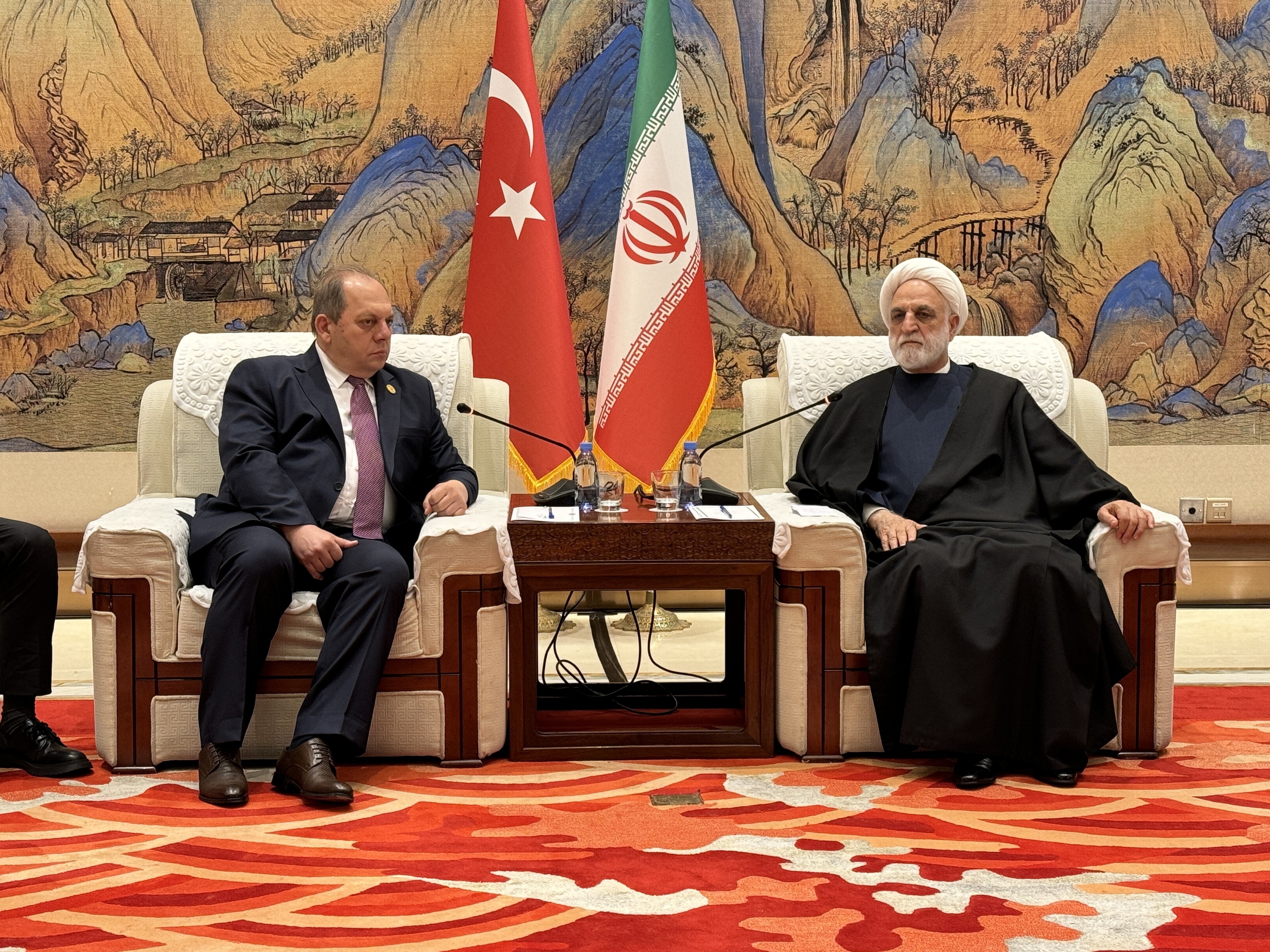
During the meeting, the Chief Justice of Iran, referring to the positive relations and interactions between Iran and Turkey based on good neighborliness, stated: “Throughout history, relations between Iran and Turkey, grounded in good neighborliness and mutual respect, have been extensive and broad.”
The Chief Justice, pointing to the necessity of drafting a cooperation agreement between Iran and Turkey regarding the rights of their respective citizens, said: “Throughout the year, some Iranians travel to Turkey, and likewise, Turkish citizens travel to Islamic Iran. The significant volume of travel by Iranian and Turkish citizens to each other’s countries necessitates the conclusion of an agreement to strengthen and secure the rights of Iranian and Turkish travelers and tourists.”
He added: “Regarding the issue of Iranian and Turkish prisoners in each other’s countries, we can also reach a comprehensive and reasonable agreement.”
Referring to the Turkish judicial official’s remarks on the concept and scope of “justice,” the Chief Justice stated: “Justice and the pursuit of justice are a grand strategy in Islamic and human life, and transgressing the boundaries of justice brings increasingly harmful consequences for human societies. However, it is crucial to note that when we speak of justice and its pursuit, we must consider the standards and principles upon which this sublime concept is based.”
Mohseni-Ejei, referring to the invitation from Turkey’s judiciary for him to visit the country and discuss the development of judicial and legal relations between Tehran and Ankara, said: “I am grateful for the invitation from Turkey’s judiciary to visit the country, and I will accept this invitation at an appropriate time, as I believe Iran and Turkey have significant potential to expand their judicial and legal relations.”
Ömer Kaz, Turkey’s highest judicial authority, addressing Mohseni-Ejei during the meeting, said: “Today’s meeting with you, the Chief Justice of the Islamic Republic of Iran, marks the starting point for new judicial cooperation between Iran and Turkey.”
He stated that the primary goal of judicial systems in various countries is to move toward achieving justice, and we must make every effort in this regard.
Ömer Kaz added: “Iran and Turkey can advance their judicial cooperation and mutual assistance in areas such as commerce, culture, and more, in a much stronger and more effective manner than before.”
Mohseni-Ejei in meeting with Uzbekistan’s Chief Judicial Authority on the sidelines of the SCO summit: we are ready to share the experiences and achievements of Iran’s Judiciary in crime prevention, judicial process digitalization, judge training, and development of dispute resolution councils, peace and reconciliation culture, mediation, and arbitration with Uzbekistan
During the meeting, the Chief Justice of the Islamic Republic of Iran, emphasizing the importance of convergence among Shanghai Cooperation Organization (SCO) member states to address regional and global challenges, stated: “Iran and Uzbekistan, with their significant cultural and civilizational commonalities, have the capacity to further expand relations and interactions in various fields, including economic, security, legal, and judicial domains. Agreements have been signed between the two sides in some of these areas, and it is necessary to take more effective steps to operationalize these matters.”
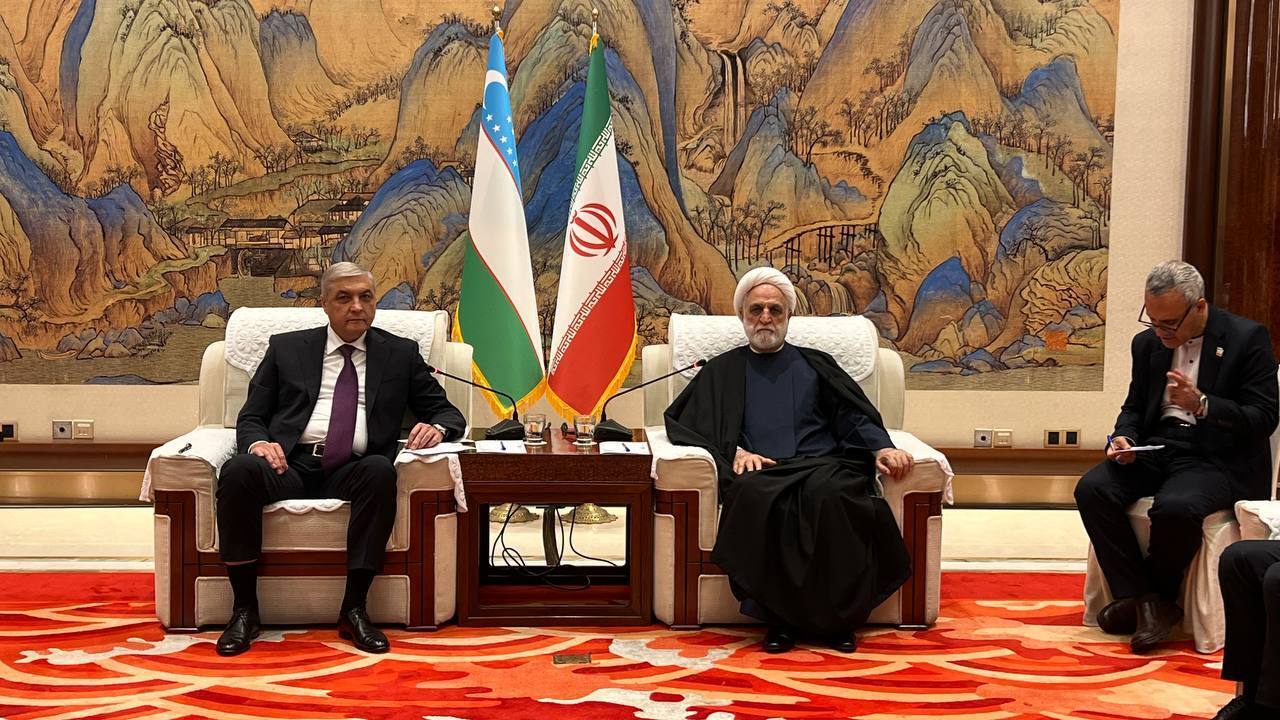
The Chief Justice noted: “The level of relations and interactions between the Islamic Republic of Iran and the Republic of Uzbekistan is steadily growing. Our late former president visited Uzbekistan, and overall, the exchanges of governmental delegations between the two sides are favorable. We hope that, through these interactions and the numerous commonalities between the two nations, more effective actions and significant steps will be taken to enhance Iran-Uzbekistan relations.”
He added: “The cultural commonalities and affinities between the peoples of Iran and Uzbekistan prompted the Islamic Republic of Iran to waive visa requirements for Uzbek citizens traveling to Iran.”
The Chief Justice asserted: “The cultural and civilizational commonalities, along with other capacities within the framework of Iran-Uzbekistan relations, create the groundwork for expanding legal and judicial cooperation between the two countries. We are ready to share the experiences and achievements of Iran’s Judiciary in the areas of ‘crime prevention,’ ‘judicial process digitalization,’ ‘judge training,’ and ‘development of dispute resolution councils, peace and reconciliation culture, mediation, and arbitration’ with the Uzbek side.”
He further stated: “Today, given the rapid development of modern technologies in human life, the use of smart and electronic tools to advance judicial and legal affairs is not a choice but a necessity.”
Bakhtiyar Islamov, Uzbekistan’s highest judicial authority, also spoke during the meeting, stating: “Relations between Iran and Uzbekistan have always been based on mutual respect and rooted in shared cultural and historical ties. Given these deep commonalities, we are ready to engage in extensive cooperation with Iran at various levels.”
Referring to the enhanced level of interactions and cooperation between Iran and Uzbekistan in recent years, he noted: “Uzbekistan fully welcomes close cooperation with Iran in various areas, particularly in judicial matters.”
Uzbekistan’s Chief Judicial Authority added: “We aim to participate actively and with a well-prepared agenda in next year’s summit of the heads of judicial systems of SCO member states, which is set to be hosted by Iran.”
Mohseni-Ejei in meeting with India’s Chief Justice on the sidelines of the SCO summit: Member states of the SCO and BRICS are predominantly influential countries in global and regional equations
Mohseni-Ejei, the Chief Justice of the Islamic Republic of Iran, who is in Hangzhou, China, to participate in the 20th Summit of the Heads of Judicial Systems of the Shanghai Cooperation Organization (SCO) member states, met and held talks with Sanjiv Khanna, the Chief Justice of the Republic of India (President of the Supreme Court of India), this afternoon local time.
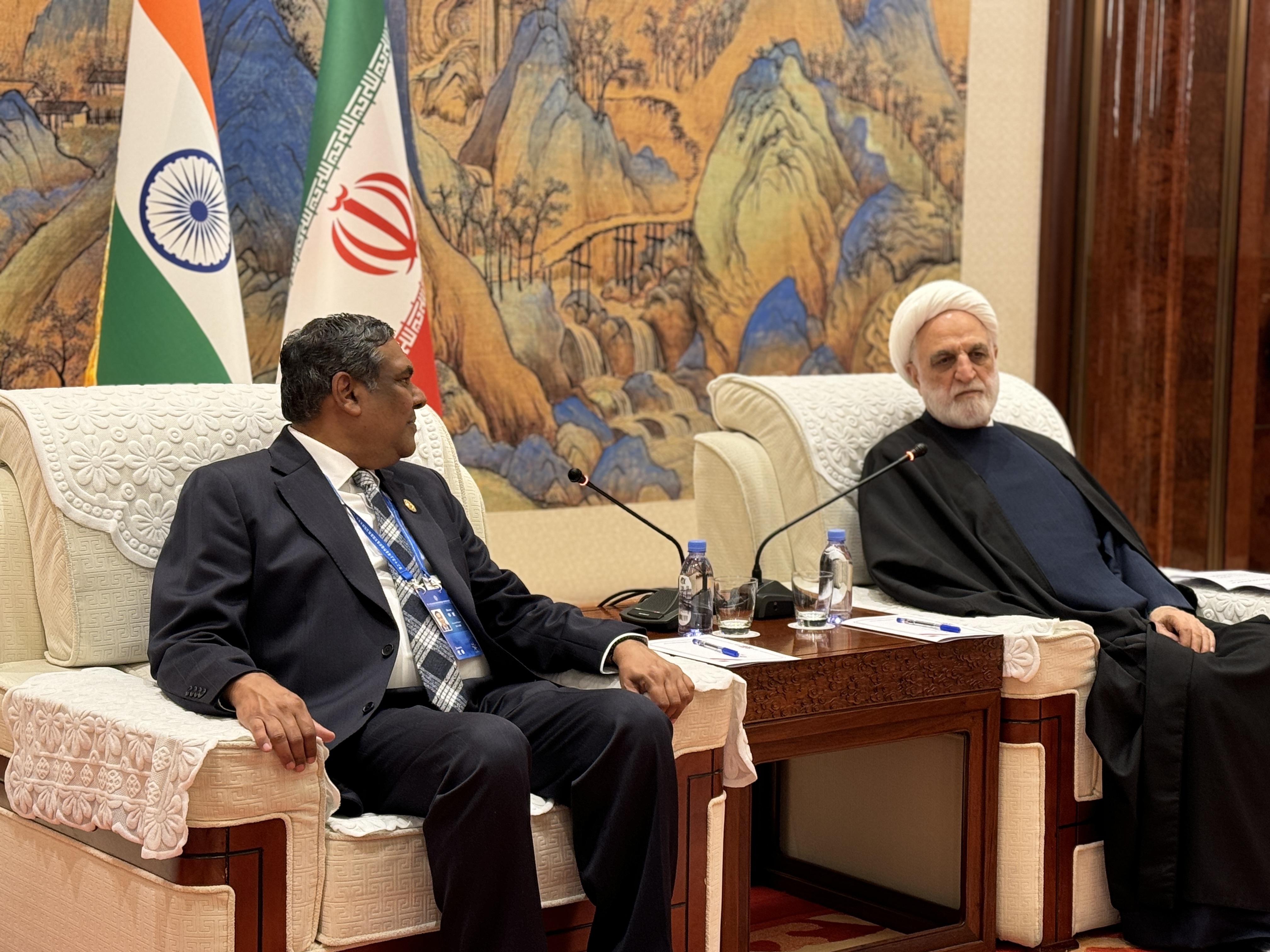
During the meeting, the Chief Justice of Iran, referring to the significant potential of organizations and alliances such as the SCO and BRICS, stated: “The member states of the two major organizations, SCO and BRICS, are predominantly influential and impactful in global and regional equations. Therefore, it is essential to further develop and expand the level of interactions among SCO and BRICS members regarding various issues and global challenges.”
The Chief Justice emphasized: “The Islamic Republic of Iran firmly believes that, within the frameworks of SCO and BRICS, we can establish a strategy of joint cooperation to overcome global challenges and issues, particularly in the realm of security. We can further enhance relations in areas where we share common interests.”
Referring to the rapid development of smart technologies and the growing impact of smart lifestyles in the global community, he said: “The near-daily advancements in the digitalization of life processes necessitate continuous refinement and updating of laws and regulations, especially in judicial and legal domains related to the digital ecosystem. In this regard, SCO and BRICS member states can expand their interactions and cooperation to address cyber threats effectively.”
The Chief Justice added: “In the realm of cryptocurrencies and digital currencies, we need to redefine concepts and update relevant laws. India has achieved successes in this area, and we welcome the opportunity to learn from India’s experiences. In return, we are ready to share our achievements and experiences in various fields, particularly in overcoming security and legal challenges and advancing electronic adjudication and judicial process digitalization, with the Indian side.”
Mohseni-Ejei, addressing the unilateralism and biased perspectives of some Western countries on various global issues, stated: “Certain Western countries have their own preferred interpretations of global issues such as ‘terrorism,’ ‘human rights,’ and ‘legal and criminal matters,’ and they seek to impose these unilateral and biased interpretations on the entire world. Independent countries must expand their joint cooperation in legal and judicial fields to counter this unfair and unjust Western approach and present a just, fair, and rights-based interpretation of concepts like ‘terrorism,’ ‘human rights,’ and ‘legal and criminal matters’ to the world.”
Referring to Iranians imprisoned in India for committing crimes and Indian nationals imprisoned in Iran for criminal acts, the Chief Justice said: “We are ready to conclude agreements with India in various legal and judicial areas, particularly regarding the extradition of convicts. We believe that some convicts from both countries serving sentences in Iran and India are not professional criminals and have committed offenses due to being misled, making them deserving of legal leniency.”
Addressing the crimes of the Zionist regime in Gaza, Mohseni-Ejei stated: “Since the onset of the new wave of brutal aggressions by the Zionist regime against Gaza, we have witnessed dozens of civilians, mostly women and children, being killed and injured daily by this regime’s war machine. The Zionists deliberately target medical centers, educational facilities, and refugee sites. Regrettably, the international community has been unable to stop the Zionist regime’s war machine. Nevertheless, we believe that platforms like the SCO summit should be utilized to compel the Zionist regime to halt its crimes in Gaza.”
Justice Sanjiv Khanna, India’s Chief Justice, during the meeting, highlighted the numerous cultural and historical commonalities between Iran and India, stating: “The widespread use of the Persian language in Indian poetry and literature, as well as the existence of historical and beautiful buildings in India constructed by Iranian architects, demonstrate the depth of cultural ties between the two countries.”
He further expressed India’s readiness to expand cooperation with Iran at various levels, adding: “We are prepared to work closely with Iranian judicial authorities to jointly and cohesively combat existing challenges.”
India’s Chief Justice also referred to his country’s judicial system’s achievements in digitalization and electronic adjudication, expressing a desire to enhance cooperation with Iran’s judiciary in these areas.
Mohseni-Ejei in meeting with Kazakhstan’s Chief Judicial Authority on sidelines of SCO Summit: Iran and Kazakhstan have several judicial agreements either being implemented or awaiting implementation
According to the Judiciary’s Media Center, Mohseni-Ejei, the Chief Justice of the Islamic Republic of Iran, who is in Hangzhou, China, to participate in the 20th Summit of the Heads of Judicial Systems of the Shanghai Cooperation Organization (SCO) member states, met and held talks with Mergalif Islambek, Kazakhstan’s highest judicial authority, this morning local time.
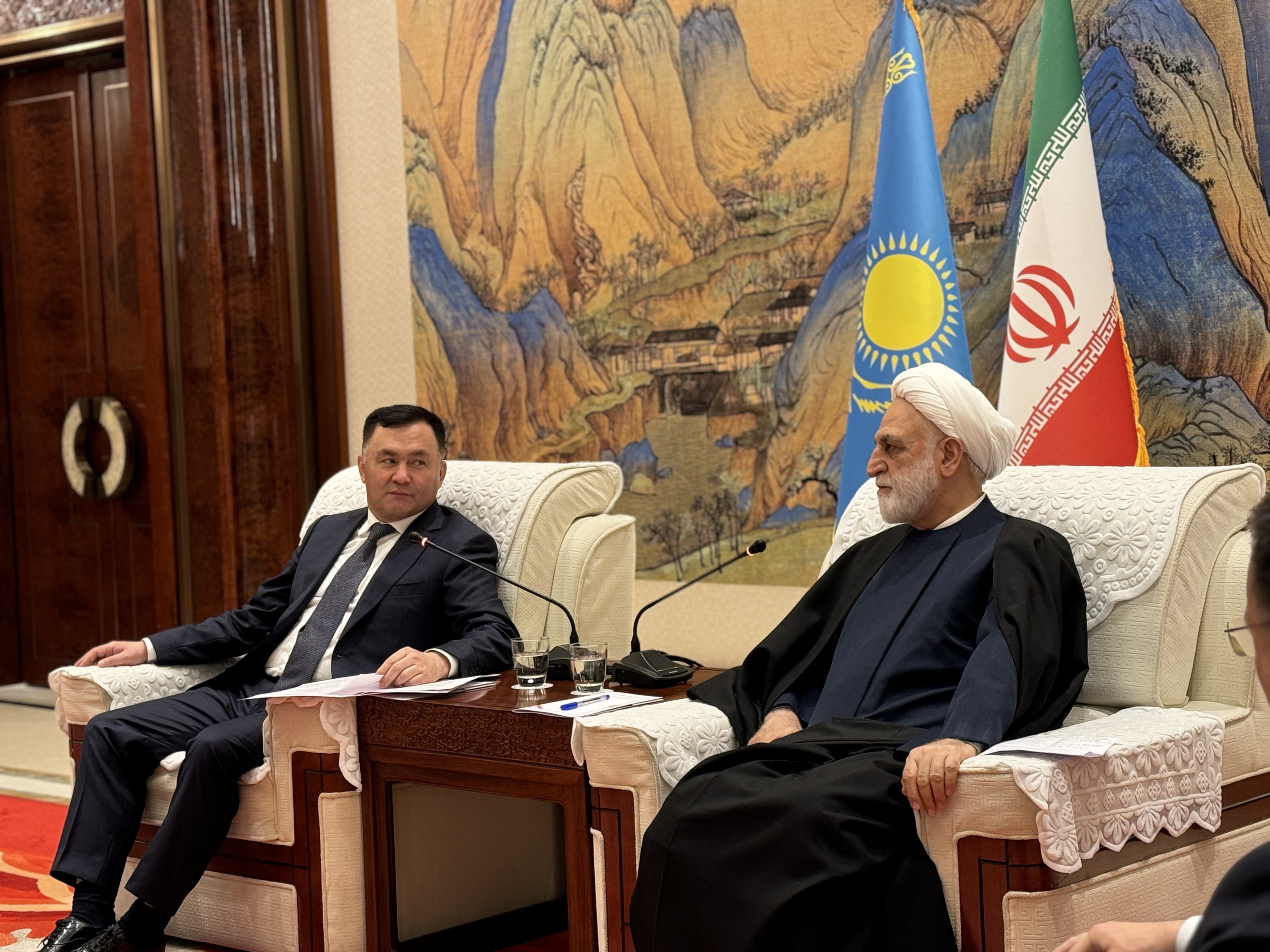
During the meeting, Mohseni-Ejei stated: “Iran and Kazakhstan have several judicial agreements that are either in the process of being implemented or need to be executed. We emphasize the implementation of these agreements to enhance judicial relations and interactions between Iran and Kazakhstan.”
The Chief Justice of the Islamic Republic of Iran noted: “The visit of Kazakhstan’s senior officials to Iran last year was highly effective and significantly contributed to strengthening and elevating bilateral relations. We must make every effort to further develop relations between our two countries.”
Mergalif Islambek, Kazakhstan’s highest judicial authority, also spoke during the meeting, stating: “Our country’s approach is to develop relations with all neighbors. Maximum cooperation and strengthening ties between Kazakhstan and Iran in all areas, particularly in the judicial domain, to address existing challenges, is on our agenda.”
He added: “We are delighted that next year’s summit of the heads of judicial systems of SCO member states will be hosted by Iran, and we are very eager to participate in this event.”
During the bilateral discussion, both sides raised specific cases of investors from the two countries who have faced legal and judicial challenges and exchanged views on solutions to resolve these issues.
Mohseni-Ejei in meeting with Tajikistan’s Chief Judicial Authority on sidelines of SCO Summit: The capacities of Iran and Tajikistan call for expanded relations in various fields, including legal and judicial matters
During the meeting, Mohseni-Ejei, referring to the numerous cultural and linguistic commonalities between Iran and Tajikistan, stated: “We believe that to address global and regional challenges, it is essential to enhance cooperation and interaction with neighboring countries, particularly Tajikistan, with which we share abundant cultural and linguistic ties.”
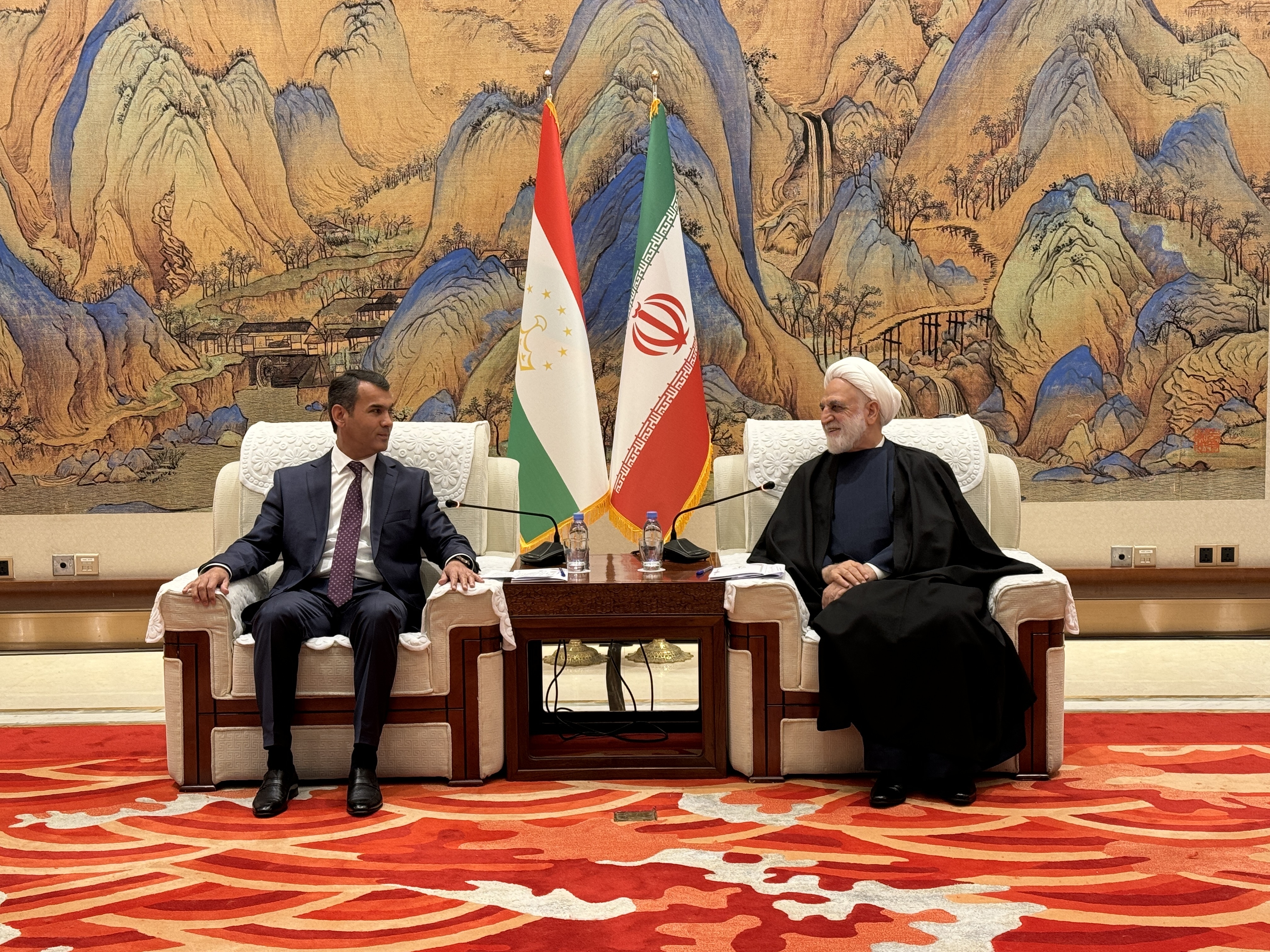
The Chief Justice added: “Given these commonalities, Iran and Tajikistan have the capacity to further align their perspectives and understanding of global issues and concepts such as human rights. We value Tajikistan’s viewpoints on human rights matters.”
He emphasized: “If we, as neighboring countries, fail to engage in interaction and collaboration to confront regional and global challenges, we will face adverse consequences. Therefore, regional interaction and neighborly cooperation to address challenges is a fundamental principle.”
The Chief Justice noted: “The capacities of Iran and Tajikistan necessitate the expansion of bilateral relations and interactions in various fields, including legal and judicial matters.”
Mohseni-Ejei stated: “The visit of the President of the Islamic Republic of Iran to Tajikistan was a blessed trip and can pave the way for further development of bilateral relations and interactions.”
Referring to the crimes and genocide committed by the Zionist regime in Gaza, he said: “The entire world, especially Muslim countries in the region, bears responsibility for the horrific crimes of the Zionist regime in Gaza. We must leverage the capacities of regional and international forums, such as the SCO, to take effective measures to counter the brutal crimes of the Zionist regime in Gaza.”
During the meeting, Tajikistan’s highest judicial authority expressed delight at meeting the Chief Justice of the Islamic Republic of Iran, stating: “Following the visit of the President of the Islamic Republic of Iran to Tajikistan, a new chapter in bilateral relations and interactions between our two neighboring countries has begun. In Tajikistan, we welcome the expansion and development of relations with the Islamic Republic of Iran in various fields.”
Tajikistan’s Chief Judicial Authority added: “The shared culture and common language of Iran and Tajikistan have broadened the scope for developing cooperation and relations, leading to similar perspectives and solutions on many issues.”
He further noted: “It is a source of pride and honor for us that, in global summits and forums, we, like Iranians, speak in Persian, and this shared language reflects the rich civilizational and cultural commonalities between Iran and Tajikistan.”
On Tuesday morning local time, Mohseni Ejei, who traveled to Hangzhou for the summit, met and held talks with Zhang Jun, the President of the Supreme People's Court of the People's Republic of China, the highest judicial authority in China.
During the meeting, the Chief Justice of Iran, expressing gratitude to the Chinese side for hosting the SCO judicial summit, addressed Zhang Jun, stating: "Your professional background indicates that you have progressed through all levels of judicial and specialized ranks and have now reached the highest judicial position in China. In this regard, we share similarities, as I too have served in various judicial responsibilities within the judicial system of the Islamic Republic of Iran."
Referring to the 25-year strategic partnership document between Iran and China and the prospects for bilateral relations, he said: "The 25-year strategic document can pave the way for significant advancements in the relations between the two countries."
Highlighting the rich civilizational heritage of Iran and China, the Chief Justice noted: "The ancient civilizations and valuable cultural heritage of Iran and China significantly contribute to enhancing Tehran-Beijing relations across various domains." Mohseni Ejei added: "The relations between Iran and China are progressing, and both countries seek to establish and consolidate global peace and security."
He emphasized: "The commonalities between Iran and China, along with the evolving bilateral relations, necessitate an increase in judicial and legal cooperation and mutual assistance between Tehran and Beijing."
Referring to the double and sometimes multiple standards of Western hegemonic countries in addressing global events, he stated: "Some Western hegemonic countries adopt double or even multiple standards in dealing with global phenomena and events, including terrorism and human rights issues. They present self-constructed definitions of these phenomena and attempt to impose them on the entire world. This must not be allowed, and we must stand against such Western approaches."
Pointing to the high potential of SCO member states for developing judicial and legal relations, he said: "SCO member states need broader cooperation and more advanced methods in areas such as combating organized crime, cybercrime, trafficking, money laundering, and terrorism."
Mohseni Ejei stressed: "In addressing social issues, we must increasingly leverage public participation and neutralize the conspiracies of certain Western hegemonic countries that seek to implement their agendas in independent societies and countries through collaborative efforts."
During the meeting, referring to the heinous crimes of the Zionist regime in Gaza, the Chief Justice stated: "For over a year and a half, the Zionist regime has committed the most atrocious crimes in Gaza. This regime has perpetrated war crimes, deliberately targeting civilians, refugees, patients, and children. We must utilize the significant potential of the SCO to halt the ongoing crimes and genocide by the Zionist regime in Gaza."
In the same meeting, Zhang Jun, President of the Supreme People's Court of China and the country's highest judicial authority, welcomed Mohseni Ejei, describing the moment of the Iranian Chief Justice's arrival in Hangzhou as a memorable and lasting occasion.He stated: "Iran holds an important and strategic position, and we seek long-term relations with Iran."
He added: "Judicial cooperation forms a significant part of the relations and interactions between Iran and China. In recent years, we have witnessed the development of judicial relations between Iran and China, and we hope this trend continues."The highest judicial authority of China expressed: "Like the Chief Justice of the Islamic Republic of Iran, we seek to elevate the level of economic, social, and cultural relations between China and Iran, and we are ready for any form of cooperation in this regard."
Referring to various meetings with Iranian judicial officials, including the President of Iran's Supreme Court and the Deputy for International Affairs of the Judiciary, he described these meetings as useful and constructive.Additionally, noting the progress of the Islamic Republic of Iran's judiciary, he requested Mohseni Ejei to share his views and perspectives on the capacities and capabilities of China's judicial system.